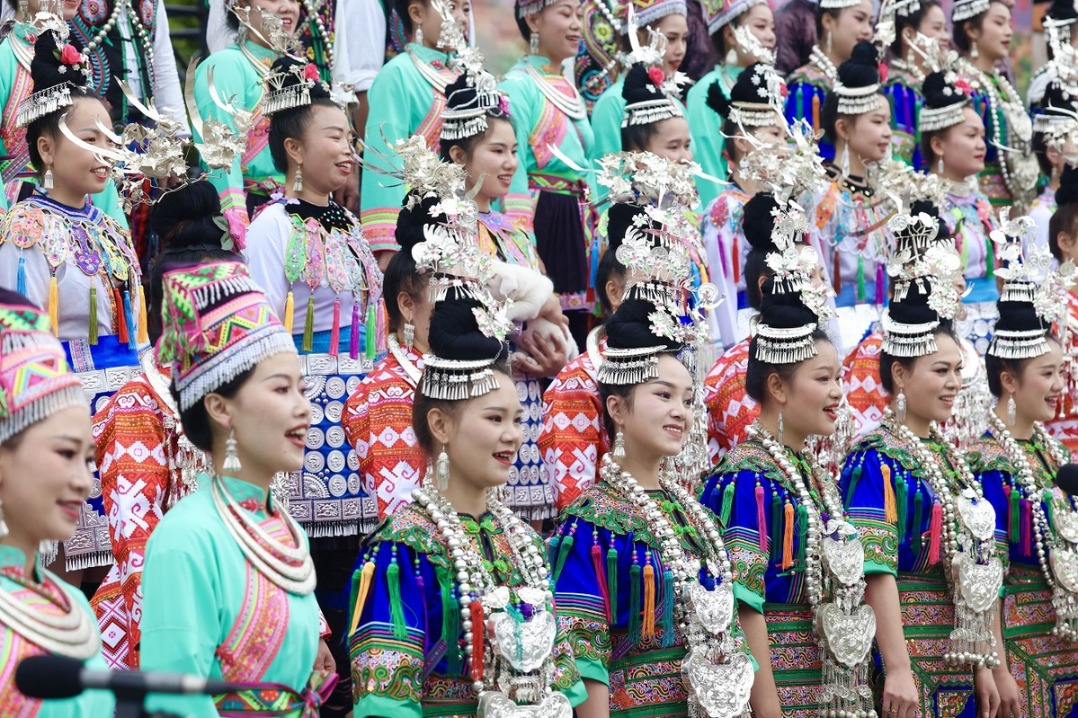US museums close Native American exhibits
By MINLU ZHANG in New York | chinadaily.com.cn | Updated: 2024-02-01 11:04
Leading museums in the United States are covering up or closing displays featuring Native American cultural objects amid new federal rules.
The new regulations require museums to "obtain free, prior and informed consent" from tribal leaders before displaying ancestral heritage items.
The American Museum of Natural History in New York City, the largest natural history museum in the world, announced on Jan 26 that it would close two halls spanning 10,000 square feet with Native American exhibits, as the exhibits are "severely outdated".
"The halls we are closing are artifacts of an era when museums such as ours did not respect the values, perspectives and indeed shared humanity of Indigenous peoples," museum President Sean Decatur said in a letter to the staff, The New York Times reported.
"The number of cultural objects on display in these halls is significant, and because these exhibits are also severely outdated, we have decided that rather than just covering or removing specific items, we will close the halls," Decatur said.
The move comes because of the implementation in early January of updated regulations under the Native American Graves Protection and Repatriation Act (NAGPRA).
Over the next five years, museums, universities, art institutions and similar venues are required to undertake essential updates to prepare all human remains and related funerary objects for repatriation, empowering tribes with increased authority throughout the process.
"The ultimate goal of the law is not to cover up exhibitions. It's not to prevent appropriate education about diverse native cultures. It's about repairing and repatriating items that have been stolen over the last couple of centuries and returning them to the rightful people," Shannon O'Loughlin, the CEO of the Association on American Indian Affairs, told China Daily.
Chicago's Field Museum earlier this month also closed several displays featuring Native American cultural items.
The Field Museum has one of the biggest collections of Native remains in the country and opened a new permanent exhibition in spring 2022 that displaced the museum's longstanding Native American exhibition since the 1950s.
"What was told in the old hall was facts of a kind," Alaka Wali, the museum's curator emeritus of North American anthropology, told radio station WBEZ in 2022. "[It did not reflect] how Native peoples themselves understand their own story."
"Pending consultation with the represented communities, we have covered all cases that we believe contain cultural items that could be subject to these regulations," the Field Museum said in a statement in January announcing its decision.
Harvard University, which has more than 5,000 Native American human remains, has said it would remove all Native American funerary items from its exhibits.
"Exhibitions have always been discussed during tribal consultations and cultural items have been removed from display at tribal request. With the new NAGPRA regulations the museum is in the process of removing all funerary belongings and likely funerary belongings off display in anticipation of consultation," Harvard University's Peabody Museum of Archaeology and Ethnology, said in a statement to China Daily.
The Cleveland Museum of Art also has taken similar steps to cover up its Native American exhibits.
The new regulations made by the Interior Department in December are an update to the NAGPRA, which was signed into law in the 1990s.
"Most Western museums use our tribal, religious and sacred and cultural patrimony and even burial items. They simply put them on the wall behind glass with a label that does nothing to educate the public about who contemporary Native peoples are and what our diverse cultures are about," O'Loughlin said.
The Interior Department reported that universities and museums in the United States held the remains of more than 96,000 Native Americans as of September 2023.
"I think requiring free prior and informed consent is the base level of what anyone can do if they want to work on Native issues," O'Loughlin said. "There are so many psychologists and anthropologists, they want to study native peoples, and a lot of that research has been done, and even DNA collected without any permission or consent, and has never benefited those native people. It's benefited the researcher and their institution."
























